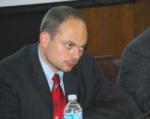Vladimir Kara Murza
If anyone needed proof that personal travel bans are the most effective way for the West to put pressure on authoritarian Kremlin officials, it is now before us. Just days after Russian opposition leader Boris Nemtsov, meeting legislators in Washington, suggested imposing US visa sanctions against senior figures implicated in corruption, electoral fraud, media censorship, and other violations of Russia’s OSCE commitments, two leading blacklist candidates abruptly changed their public tone. No legislation has yet been introduced or even drafted, no lists with specific names published. But the very suggestion appeared to have seriously racked some nerves in Moscow’s highest offices.
Kremlin deputy chief of staff Vladislav Surkov, the regime’s domestic policy enforcer, has never shied away from stating his views in public. He coined the concept of Russia’s “sovereign democracy” in opposition to Western political systems. He publicly warned against expecting a “political thaw or sludge” — meaning liberalization — after the formal changeover at the Kremlin in 2008. He dismissed complaints over the absence of democratic elections in Russia as “yammer.” Yet the moment visa sanctions became a topic of serious discussion in Washington, Mr. Surkov was a changed man. Poll numbers for the Kremlin’s United Russia party, he lamented, are “anomalously high.” Russia’s political scene lacks an influential liberal party. The opposition will grow in strength and achieve power within a decade. Indeed, already in the 2011 elections United Russia will lose its two-thirds constitutional majority in the Duma. Russia’s goal, according to the reborn Mr. Surkov, is to become “a Western democratic state.”
All of this was said at a meeting with American students two days after Mr. Nemtsov announced the opposition’s push to blacklist the likes of Mr. Surkov in the West. Also present at that meeting was Vasily Yakemenko, minister for youth in Vladimir Putin’s government and founder of the Nashi movement. Nashi and similar pro-Kremlin youth groups specialize in harassing opposition leaders and independent journalists. Among their recent accomplishments: the weeks-long hounding of columnist Alexander Podrabinek, who dared to question the re-Sovietization of Russian life; the photo installation titled “You are not welcome here,” with pictures of Russian opposition politicians and human rights activists as well as some foreign leaders dressed in Nazi uniforms; and the public trampling of portraits of opposition leaders at a Moscow rally. Indeed, the initial reaction of pro-Kremlin gangs to Mr. Nemtsov’s blacklist initiative was an attack on him at Moscow’s Sheremetyevo airport as he returned home from the US. The immediate and strongly-worded statement from Senator Benjamin L. Cardin (D-Md.), who chairs the US Helsinki Commission, served as a reminder that this time Washington really is paying attention. On Monday, in an interview with the popular newspaper Komsomolskaya Pravda, Vasily Yakemenko openly pleaded with his goons to “stop dancing on the portraits of opposition leaders.” The youth minister knows well what it means to be blacklisted. In 2007, he found himself — along with scores of Nashi activists — on the EU Schengen zone no-entry list after the group harassed British and Estonian ambassadors. No foreign diplomat in Moscow has been targeted since the travel ban went into effect.
Meanwhile, Russia’s opposition continues its efforts with regard to visa sanctions. As a point of reference for Western legislators, Mr. Nemtsov has compiled a draft blacklist that contains nine of the most notable violators of the rule of law in Russia. Apart from Mr. Surkov and Mr. Yakemenko, the list, symbolically headed by Mr. Putin, includes electoral commission chairman Vladimir Churov (for facilitating election fraud), deputy prime minister Igor Sechin (for organizing the persecution and looting of Mikhail Khodorkovsky and his oil company), and four government prosecutors in the first and second Khodorkovsky trials. “When we restore the Constitution, democracy and the rule of law, these figures should appear in court and may be subject to lustrations legislation,” Mr. Nemtsov wrote in the preface to the blacklist, “But while the justice system is absent in our own country, we must press for sanctions in Europe and the United States. Let those who built a thievish police state travel in North Korea, Iran and Belarus.”

